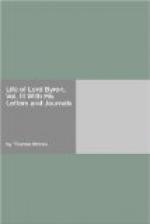“On politics, he used sometimes to express a high strain of what is now called Liberalism; but it appeared to me that the pleasure it afforded him as a vehicle of displaying his wit and satire against individuals in office was at the bottom of this habit of thinking, rather than any real conviction of the political principles on which he talked. He was certainly proud of his rank and ancient family, and, in that respect, as much an aristocrat as was consistent with good sense and good breeding. Some disgusts, how adopted I know not, seemed to me to have given this peculiar and, as it appeared to me, contradictory cast of mind: but, at heart, I would have termed Byron a patrician on principle.
“Lord Byron’s reading did not seem to me to have been very extensive either in poetry or history. Having the advantage of him in that respect, and possessing a good competent share of such reading as is little read, I was sometimes able to put under his eye objects which had for him the interest of novelty. I remember particularly repeating to him the fine poem of Hardyknute, an imitation of the old Scottish Ballad, with which he was so much affected, that some one who was in the same apartment asked me what I could possibly have been telling Byron by which he was so much agitated.
I saw Byron, for the last time, in 1815, after I returned from France. He dined, or lunched, with me at Long’s in Bond Street. I never saw him so full of gaiety and good-humour, to which the presence of Mr. Mathews, the comedian, added not a little. Poor Terry was also present. After one of the gayest parties I ever was present at, my fellow-traveller, Mr. Scott, of Gala, and I set off for Scotland, and I never saw Lord Byron again. Several letters passed between us—one perhaps every half year. Like the old heroes in Homer, we exchanged gifts:—I gave Byron a beautiful dagger mounted with gold, which had been the property of the redoubted Elfi Bey. But I was to play the part of Diomed, in the Iliad, for Byron sent me, some time after, a large sepulchral vase of silver. It was full of dead men’s bones, and had inscriptions on two sides of the base. One ran thus:—’The bones contained in this urn were found in certain ancient sepulchres within the land walls of Athens, in the month of February, 1811.’ The other face bears the lines of Juvenal:




